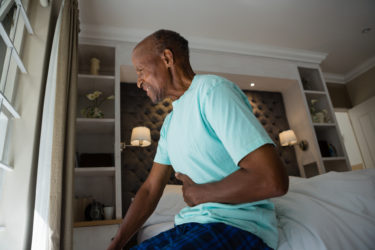Kidney stones in the elderly- What you should know as a caregiver

Kidney stones are as painful as they sound.
Anyone who has been through the experience of having kidney stones will confirm this.
One of the things we strive to do here on the blog is to educate you on common healthcare problems you can expect to encounter as a caregiver and how you can offer your assistance when these problems arise.
By the time you’re done reading this post, you will know:
- What kidney stones are and symptoms
- The kind of medical care you can expect for kidney stones in the elderly
- What complications can arise from kidney stones
- The kind of support you can provide your elderly loved one during an episode with kidney stones
What are kidney stones?
Kidney stones are hard mineral and salt deposits that form in your kidneys. They can be as small as a grain of sand and you can pass it without even knowing. Or they could be as large enough to prevent a person from passing urine.
Your kidneys are the main organ in your urinary tract and is responsible for creating urine.
Typically there are natural chemicals within your kidney that dissolves salts and minerals. When there is a malfunction in the production of these natural chemicals, kidney stones can form.
While doctors are not completely sure what causes kidney stones, there are certain factors that can increase a person’s risk for kidney stones.
- Lack of water. Your kidneys need water in order to produce urine. If a person’s water intake is low, this could lead to kidney stone formation.
- Foods that are high in oxalate. In people who are prone to kidney stones, eating foods that are high in oxalate like rhubarb, spinach, beets, wheat germ and peanuts could increase the likelihood of kidney stones. A doctor may thus advise that you restrict the intake of these foods.
- Kidney stones can form in response to a urinary tract infection (UTI).
If kidney stones are related to frequent UTIs, UTI monitoring pads may help
- In some instances, there is a hereditary link to kidney stones. In these individuals there is usually an overproduction of the amino acid cysteine because of the disorder.
- Obesity.
- Digestive problems.
Symptoms of kidney stones in the elderly
The following symptoms are associated with the presence of kidney stones.
- Sharp pains in the back, side, lower abdomen and groin
- Pink, red or brown blood in urine
- A constant need to urinate
- Pain while urinating
- Difficulty urinating
- Cloudy or foul-smelling urine
In severe instances, these symptoms may be accompanied by
- nausea
- vomiting
- fever and
- chills
Any or a combination of these symptoms should be reported immediately to a medical professional or health facility.
It is especially important to note that if the kidney stones are being caused by an infection- usually indicated by cloudy or foul-smelling urine- not seeing medical attention could lead to sepsis.
Sepsis is a medical condition where an infection spreads into a person’s blood stream.
Sepsis is especially difficult to treat and can lead to death.
What you can do as a caregiver to support your elderly loved one with kidney stones
Prevention is always better than cure.
Thus, as a caregiver, you can encourage your elderly loved one to drink more fluids so they don’t become dehydrated.
If you suspect the presence of a kidney stone based on the reports of your elderly loved one, report them to a doctor immediately.
Immediate medical attention is the key to making sure there are no complications.
Treatment of kidney stones is based on the size of the kidney stone, where they are located and what type of kidney stone it is.
If the kidney stone is small enough, the doctor may simply send your elderly loved one home with advice to drink more fluids so they can pass the stone while they are urinating.
The doctor may ask that you save the stone and bring it back so they can study what type of stone it is and give you better advise on what to do to reduce the risk that it will happen again.
If the stone is too big to be passed, a specialist doctor called a urologist may use a procedure called shock wave lithotripsy to break up the kidney stone into smaller pieces so they can be passed.
Alternatively, a surgical procedure called percutaneous nephrolithotomy where the doctor goes into the kidney through a small cut in the back to remove the kidney stone. This will require a few days stay in the hospital so the doctors can observe recovery.
It is also possible that the doctor will prescribe medications to prevent kidney stones from forming in the future.
Whatever the case may be, you as a caregiver will be providing support throughout this very painful experience.
Closing Thoughts
As you can see, kidney stones are far from a walk in the park.
In this post, you have learned what kidney stones are, what causes them and what you can expert in terms of medical care for your elderly loved one.
If you found this post useful, please consider sharing it with someone else.
